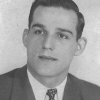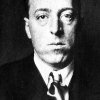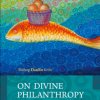Komenich, a 6'7 center, played collegiately at the University of Wyoming after a standout high school career at Lew Wallace High School in Gary, Indiana. He played for the Cowboys from 1941–1943 and for the 1945-46 season. Alongside guard Ken Sailors, Komenich led the Cowboys to the 1943 National Championship.
.Komenich was named an All-American in 1943 and 1946. He was elected to the University of Wyoming athletics Hall of Fame in 2006 and is also a member of the Indiana Basketball Hall of Fame.
During the 1949-50 season, Milo Komenich played in 64 games for the Anderson Packers, averaging 9.9 points per game. Komenich also played for the Fort Wayne Pistons of the National Basketball League and the Dow Chemical and 20th Century Fox teams of the AAU.
From: Wikipedia





